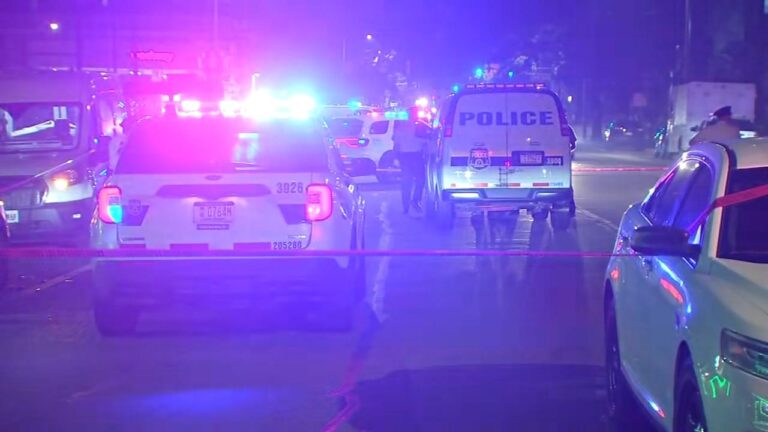Weekend Violence Clouds Philadelphia’s Progress in Crime Reduction
Philadelphia faced a troubling weekend marked by a notable increase in violent acts, which contrasted sharply with the city’s broader trend of decreasing crime rates. Law enforcement agencies recorded numerous shootings and aggravated assaults spanning several neighborhoods, triggering heightened alerts and calls for stronger community cooperation and police visibility. This sudden escalation has unsettled both residents and officials, who underscore the necessity of tackling underlying issues such as economic disparities and insufficient support for vulnerable groups.
Highlights from the weekend’s violent episodes include:
- At least 10 separate shooting incidents resulting in multiple critical injuries.
- Most violent events occurred between Friday evening and early Sunday morning.
- North Philadelphia and Kensington were the hardest hit areas.
- Police have responded by boosting patrols and community outreach in these hotspots.
| Neighborhood | Incidents Reported | Officers Deployed |
|---|---|---|
| North Philadelphia | 5 shootings, 8 assaults | 24 officers |
| Kensington | 3 shootings, 4 assaults | 18 officers |
| Southwest Philadelphia | 2 shootings, 3 assaults | 15 officers |
Community Advocates Demand Focused Strategies to Tackle Gun Violence
In light of the weekend’s alarming rise in gun-related violence, Philadelphia’s community leaders and activists are calling for more precise and targeted interventions. Despite the city’s overall crime reduction, the recent spike highlights gaps in broad policing approaches. Advocates stress that without concentrated efforts in identified trouble spots, residents will continue to face heightened dangers, threatening the gains made in safer districts.
Proposed community-driven solutions emphasize:
- Boosting funding for youth engagement and mentorship programs
- Expanding access to mental health and conflict mediation services
- Enhancing collaboration between police and neighborhood organizations
- Utilizing data analytics for swift responses to gun violence incidents
| Intervention | Anticipated Impact |
|---|---|
| Youth Outreach Programs | Decrease in gang recruitment rates |
| Crisis Response Teams | Reduction in violent confrontations |
| Community Policing Initiatives | Strengthened trust and cooperation |
| Violence Interruption Efforts | Fewer shooting incidents |
Police Deploy Strategic Patrols in Violence-Prone Areas to Enhance Safety
Responding to the weekend’s violent surge, Philadelphia’s police have intensified patrols in neighborhoods identified as high-risk. These targeted deployments aim to deter criminal activity by increasing officer visibility during critical hours. Leveraging crime data and analytics, law enforcement seeks to proactively engage communities and prevent violent incidents before they escalate.
Core components of the enhanced patrol strategy include:
- Specialized units trained in de-escalation and community engagement
- Partnerships with local groups to build trust and gather actionable intelligence
- Use of advanced surveillance technologies such as CCTV and acoustic gunshot detection
- Adaptive patrol schedules responsive to evolving crime patterns and community input
| Neighborhood | Patrol Hours | Incidents Last Weekend | Patrol Focus |
|---|---|---|---|
| North Philadelphia | 6 PM – 2 AM | 15 | Suppressing Gang Activity |
| West Philadelphia | 4 PM – Midnight | 12 | Combating Drug-Related Violence |
| South Philadelphia | 7 PM – 3 AM | 10 | Reducing Theft and Assault |
Experts Advocate Investing in Youth and Mental Health for Sustainable Violence Prevention
Public safety experts are urging Philadelphia’s policymakers and community stakeholders to prioritize funding for youth development programs and mental health services as a foundational strategy to reduce violent crime. These investments address critical social determinants and foster long-term community resilience. Initiatives centered on mentorship, education, and active community participation have proven effective in steering at-risk youth away from criminal pathways.
Moreover, the rising prevalence of mental health challenges—exacerbated by recent economic pressures and social upheaval—highlights the urgent need for accessible counseling and crisis intervention. Strengthening mental health infrastructure can significantly lower violence linked to untreated psychological issues. The table below illustrates the positive outcomes of similar programs implemented in comparable urban settings:
| Program Type | Crime Reduction Achieved | Increase in Youth Participation |
|---|---|---|
| After-School Mentorship | 15% | 30% |
| Community Mental Health Clinics | 20% | 25% |
| Violence Prevention Workshops | 18% | 40% |
Conclusion: Balancing Progress with Urgent Action
As Philadelphia confronts the repercussions of a violent weekend, city officials and community advocates acknowledge that despite an encouraging overall decline in crime, the recent spike in violence demands immediate and focused attention. Ongoing efforts to enhance public safety must integrate targeted interventions and resource allocation to prevent future flare-ups. The city’s ability to sustain its crime reduction momentum while safeguarding residents from sudden violence surges will be a critical test of its resilience and commitment to community well-being.








